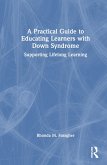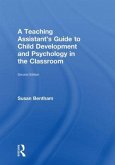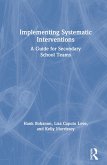Douglas J Fiore, Julie Anne Fiore
Partners for Special Needs
How Teachers Can Effectively Collaborate with Parents and Other Advocates
Douglas J Fiore, Julie Anne Fiore
Partners for Special Needs
How Teachers Can Effectively Collaborate with Parents and Other Advocates
- Gebundenes Buch
- Merkliste
- Auf die Merkliste
- Bewerten Bewerten
- Teilen
- Produkt teilen
- Produkterinnerung
- Produkterinnerung
Learn how to collaborate with parents and special education advocates to ensure student success. This practical book shows you how to navigate the tricky path to meeting special education goals and outcomes. It also provides strategies to help you communicate and partner more effectively with families and specialists.
Andere Kunden interessierten sich auch für
![Contemporary Special Education Research Contemporary Special Education Research]() Contemporary Special Education Research197,99 €
Contemporary Special Education Research197,99 €![Understanding and Teaching Reading Comprehension Understanding and Teaching Reading Comprehension]() Jane OakhillUnderstanding and Teaching Reading Comprehension242,99 €
Jane OakhillUnderstanding and Teaching Reading Comprehension242,99 €![A Practical Guide to Educating Learners with Down Syndrome A Practical Guide to Educating Learners with Down Syndrome]() Rhonda M FaragherA Practical Guide to Educating Learners with Down Syndrome176,99 €
Rhonda M FaragherA Practical Guide to Educating Learners with Down Syndrome176,99 €![Sexuality for All Abilities Sexuality for All Abilities]() Katie ThuneSexuality for All Abilities159,99 €
Katie ThuneSexuality for All Abilities159,99 €![A Teaching Assistant's Guide to Child Development and Psychology in the Classroom A Teaching Assistant's Guide to Child Development and Psychology in the Classroom]() Susan BenthamA Teaching Assistant's Guide to Child Development and Psychology in the Classroom176,99 €
Susan BenthamA Teaching Assistant's Guide to Child Development and Psychology in the Classroom176,99 €![Maximising the Impact of Teaching Assistants Maximising the Impact of Teaching Assistants]() Rob WebsterMaximising the Impact of Teaching Assistants174,99 €
Rob WebsterMaximising the Impact of Teaching Assistants174,99 €![Implementing Systematic Interventions Implementing Systematic Interventions]() Hank BohanonImplementing Systematic Interventions126,99 €
Hank BohanonImplementing Systematic Interventions126,99 €-
-
-
Learn how to collaborate with parents and special education advocates to ensure student success. This practical book shows you how to navigate the tricky path to meeting special education goals and outcomes. It also provides strategies to help you communicate and partner more effectively with families and specialists.
Hinweis: Dieser Artikel kann nur an eine deutsche Lieferadresse ausgeliefert werden.
Hinweis: Dieser Artikel kann nur an eine deutsche Lieferadresse ausgeliefert werden.
Produktdetails
- Produktdetails
- Verlag: Taylor & Francis
- Seitenzahl: 98
- Erscheinungstermin: 30. November 2017
- Englisch
- Abmessung: 244mm x 170mm x 8mm
- Gewicht: 381g
- ISBN-13: 9781138714700
- ISBN-10: 1138714704
- Artikelnr.: 50365944
- Herstellerkennzeichnung
- Libri GmbH
- Europaallee 1
- 36244 Bad Hersfeld
- gpsr@libri.de
- Verlag: Taylor & Francis
- Seitenzahl: 98
- Erscheinungstermin: 30. November 2017
- Englisch
- Abmessung: 244mm x 170mm x 8mm
- Gewicht: 381g
- ISBN-13: 9781138714700
- ISBN-10: 1138714704
- Artikelnr.: 50365944
- Herstellerkennzeichnung
- Libri GmbH
- Europaallee 1
- 36244 Bad Hersfeld
- gpsr@libri.de
Douglas J. Fiore is the author of eight books for educators, including School-Community Relations and Dealing with Difficult Parents, written with Todd Whitaker. Doug has served as a teacher, a principal, a professor, and a consultant, and he most recently served as a provost and vice president for academic affairs. Julie Anne Fiore has been an educator for thirteen years, spending her most recent year as an Inclusion Intervention Specialist for middle school students. A proponent of partnerships, she insists that teachers engage students, parents, guardians, and those they hire in ensuring student success.
About the Authors
Preface
PART I THE PRACTICE OF SPECIAL EDUCATION
Chapter 1 The Development of Special Education Practices
The Legal Environment
Considerations to Ponder
If It's Not Legal, Consider It Illegal
Conclusion
Chapter 2 The Evolution of Instruction
Foundational Perspective of Universal Design for Learning (UDL)
Conclusion
Considerations to Ponder
Reflection Activity Worksheet
Chapter 3 The Individualized Education Plan (IEP) Process
The Exceptional Learner
The Instructional Team: Changing "Me" to "We"
Gathering Evidence: Who, What, When, and Where
Discussing the Data: Who and What
Reviewing the Environment: Where and When
Analyzing the Problem: Why and How
The Eight Components of an IEP
Considerations to Ponder
Conclusion
PART II COLLABORATING AND COMMUNICATING
Chapter 4 Effective Communication and Meeting Strategies
The Communication Process
Nonverbal Communication
Language Barriers
Culture Barriers
Physical Barriers
Perception Checking
Communication Strategies for Meetings
Considerations to Ponder
Conclusion
Chapter 5 "Rule of Three": Working with Professional Advocates
Envisioning the 21st-Century Classroom
Instructional Implications
Considerations to Ponder
"Rule of Three"
Parents: Partners in Language, Communication, and Data Collection
Advocate: Mediator, Negotiator, and Objective Third Party
"Rule of Three": Teacher, Parent, and Advocate
Conclusion
Chapter 6 Advocating as a Parent
Considerations to Ponder
Parent-Teacher Partnering Tips
Advocacy Support
Know the Lingo
Conclusion
Chapter 7 How to Keep Parent Relationships Positive
Rule #1
Pay Attention to the F Word
The Importance of Being Proactive
Parent Involvement at School and at Home
Considerations to Ponder
Conclusion
Afterword
References
Appendix
Preface
PART I THE PRACTICE OF SPECIAL EDUCATION
Chapter 1 The Development of Special Education Practices
The Legal Environment
Considerations to Ponder
If It's Not Legal, Consider It Illegal
Conclusion
Chapter 2 The Evolution of Instruction
Foundational Perspective of Universal Design for Learning (UDL)
Conclusion
Considerations to Ponder
Reflection Activity Worksheet
Chapter 3 The Individualized Education Plan (IEP) Process
The Exceptional Learner
The Instructional Team: Changing "Me" to "We"
Gathering Evidence: Who, What, When, and Where
Discussing the Data: Who and What
Reviewing the Environment: Where and When
Analyzing the Problem: Why and How
The Eight Components of an IEP
Considerations to Ponder
Conclusion
PART II COLLABORATING AND COMMUNICATING
Chapter 4 Effective Communication and Meeting Strategies
The Communication Process
Nonverbal Communication
Language Barriers
Culture Barriers
Physical Barriers
Perception Checking
Communication Strategies for Meetings
Considerations to Ponder
Conclusion
Chapter 5 "Rule of Three": Working with Professional Advocates
Envisioning the 21st-Century Classroom
Instructional Implications
Considerations to Ponder
"Rule of Three"
Parents: Partners in Language, Communication, and Data Collection
Advocate: Mediator, Negotiator, and Objective Third Party
"Rule of Three": Teacher, Parent, and Advocate
Conclusion
Chapter 6 Advocating as a Parent
Considerations to Ponder
Parent-Teacher Partnering Tips
Advocacy Support
Know the Lingo
Conclusion
Chapter 7 How to Keep Parent Relationships Positive
Rule #1
Pay Attention to the F Word
The Importance of Being Proactive
Parent Involvement at School and at Home
Considerations to Ponder
Conclusion
Afterword
References
Appendix
About the Authors
Preface
PART I THE PRACTICE OF SPECIAL EDUCATION
Chapter 1 The Development of Special Education Practices
The Legal Environment
Considerations to Ponder
If It's Not Legal, Consider It Illegal
Conclusion
Chapter 2 The Evolution of Instruction
Foundational Perspective of Universal Design for Learning (UDL)
Conclusion
Considerations to Ponder
Reflection Activity Worksheet
Chapter 3 The Individualized Education Plan (IEP) Process
The Exceptional Learner
The Instructional Team: Changing "Me" to "We"
Gathering Evidence: Who, What, When, and Where
Discussing the Data: Who and What
Reviewing the Environment: Where and When
Analyzing the Problem: Why and How
The Eight Components of an IEP
Considerations to Ponder
Conclusion
PART II COLLABORATING AND COMMUNICATING
Chapter 4 Effective Communication and Meeting Strategies
The Communication Process
Nonverbal Communication
Language Barriers
Culture Barriers
Physical Barriers
Perception Checking
Communication Strategies for Meetings
Considerations to Ponder
Conclusion
Chapter 5 "Rule of Three": Working with Professional Advocates
Envisioning the 21st-Century Classroom
Instructional Implications
Considerations to Ponder
"Rule of Three"
Parents: Partners in Language, Communication, and Data Collection
Advocate: Mediator, Negotiator, and Objective Third Party
"Rule of Three": Teacher, Parent, and Advocate
Conclusion
Chapter 6 Advocating as a Parent
Considerations to Ponder
Parent-Teacher Partnering Tips
Advocacy Support
Know the Lingo
Conclusion
Chapter 7 How to Keep Parent Relationships Positive
Rule #1
Pay Attention to the F Word
The Importance of Being Proactive
Parent Involvement at School and at Home
Considerations to Ponder
Conclusion
Afterword
References
Appendix
Preface
PART I THE PRACTICE OF SPECIAL EDUCATION
Chapter 1 The Development of Special Education Practices
The Legal Environment
Considerations to Ponder
If It's Not Legal, Consider It Illegal
Conclusion
Chapter 2 The Evolution of Instruction
Foundational Perspective of Universal Design for Learning (UDL)
Conclusion
Considerations to Ponder
Reflection Activity Worksheet
Chapter 3 The Individualized Education Plan (IEP) Process
The Exceptional Learner
The Instructional Team: Changing "Me" to "We"
Gathering Evidence: Who, What, When, and Where
Discussing the Data: Who and What
Reviewing the Environment: Where and When
Analyzing the Problem: Why and How
The Eight Components of an IEP
Considerations to Ponder
Conclusion
PART II COLLABORATING AND COMMUNICATING
Chapter 4 Effective Communication and Meeting Strategies
The Communication Process
Nonverbal Communication
Language Barriers
Culture Barriers
Physical Barriers
Perception Checking
Communication Strategies for Meetings
Considerations to Ponder
Conclusion
Chapter 5 "Rule of Three": Working with Professional Advocates
Envisioning the 21st-Century Classroom
Instructional Implications
Considerations to Ponder
"Rule of Three"
Parents: Partners in Language, Communication, and Data Collection
Advocate: Mediator, Negotiator, and Objective Third Party
"Rule of Three": Teacher, Parent, and Advocate
Conclusion
Chapter 6 Advocating as a Parent
Considerations to Ponder
Parent-Teacher Partnering Tips
Advocacy Support
Know the Lingo
Conclusion
Chapter 7 How to Keep Parent Relationships Positive
Rule #1
Pay Attention to the F Word
The Importance of Being Proactive
Parent Involvement at School and at Home
Considerations to Ponder
Conclusion
Afterword
References
Appendix








